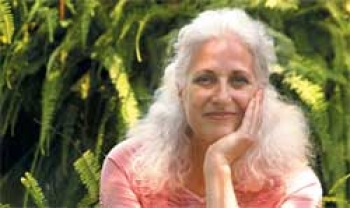Jacqueline Kramer, author of Buddha Mom-the Path of Mindful Mothering and 10 Spiritual Practices for Busy parents, has been studying and practicing Buddhism for over 30 years in the Sri Lankan Theravadin tradition and Zen for 8 years. When she became pregnant with her daughter she applied Buddhist principles to her pregnancy, birthing and mothering to good effect. This led to her books and teachings. In 2008 Jacqueline received the Outstanding Women in Buddhism Award at the U.N. day for women in Thailand for her work teaching Buddhism to mothers. She is the director of the Hearth Foundation - www.hearth-foundation.org, which offers online lay Buddhist practice classes designed for mothers, a monthly newsletter and other resources for today’s mothers seeking spiritual support and inspiration. Hearth has students in Australia, Argentina, New Zealand, Europe, the US, Canada and throughout the world. She is past vice president of Alliance for Bikkhunis, has been on their editorial board, and actively supports female monasticism. Jacqueline is currently studying koans with John Tarrant, writing on femininity and Buddhsim for Turning Wheel, and other magazines, and developing teachings informed by feminine spirituality. Jacqueline lives in Sonoma County, California.
---
This article was a dharma talk originally published in Hearth Foundation's newsletter, March 2012.
This article was a dharma talk originally published in Hearth Foundation's newsletter, March 2012.
Caroline Myss, the medical intuitive, once said that when you set a heartfelt intention in motion, be prepared-for anything! This is something I’ve experienced many times in my life so when the koan, what is my inmost request, was given on a meditation retreat this February, I knew I was playing with fire. Within the still pool of deep meditation the answer floated to the surface. What was my inmost request? To really, really feel oneness with all things- to remove any imagined barriers that separate me from life. Sounds nice, no? Well, don’t forget to read the fine print. Removing all imagined barriers does not only mean barriers between myself and those things and people I want to be closer to, it means ALL barriers, including the ones put up in my imagined defense.
Within less than an hour after realizing this inmost request I went for a walk and returned to the meditation hall to find that my seat, the one I had set up perfectly for comfort during long sittings, had been taken apart. All that was left was a bare chair. Beside the chair sat a woman who had magically appeared in the short time I’d vacated the seat. Surrounding her were pillows of every ilk, including ones that looked suspiciously like the ones that had been so happily sitting up on my chair less than an hour ago. Quietly, in a state of pretty deep equanimity, I found some pillows, set up my spot anew, and continued meditating. The woman who had made her nest beside me, proceeded to make strange noises and bustle about wildly. I thought, OK…. I can deal with this, and continued my exploration into the vastness.
During walking meditation the same woman pulled out a cane and hurled herself up, if that’s even possible, and entered the walking line. The size of her energy was beyond human. She demanded to be seen and heard by everyone and, it seemed, especially by me. During the evening talk she seized the room with wild rants about stars, science, and the horror she felt while watching her body deteriorate before her eyes. She had no sense of the room or the presence of other people in the room. In her own world, she only calmed down- slightly- when all eyes were on her. As soon as the attention was turned towards someone else she commenced crumbling up papers, tapping loudly on the floor and making quick, sharp gestures.
There is a Tibetan story about a monk in a cave who is practicing the perfection of patience. A demon comes to visit this monk and proceeds to mess up his cave, slurp his tea and tear up his beloved sutra books. For a while the monk holds it together but eventually he explodes, shouting for the demon to leave his cave. The demon looks the monk in the eyes, takes a sip of tea, and asks, “So, where is your perfection of patience now?”
It’s much easier to be patient when there’s no one challenging that patience, and much easier to maintain meditative equanimity in a safe and silent hall. It’s easier to imagine unification with all beings when the beings surrounding us don’t appear to threaten our well-being. But how about when those beings grab our belongings and frighten us with their rants and raves? Or, how about when the demons suck up all the air in the room? What I’d have to give up in order to really know my oneness with all beings became crystal clear. I’d have to give up any imagined state of security, I’d have to give up the barriers between myself and those I deem threatening, the demons, the snakes and the spiders, those who steal my property and mess up my tidy world. Thus reads the fine print.















